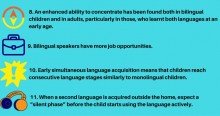Before we proceed with the facts about being bilingual, let’s take a closer look at the most important definitions (according to Cambridge Dictionary).
Bilingualism – ability to use two languages equally well.
Monolingualism – ability to speak only one language.
Did I say I consider myself painfully monolingual? I know, I’m just writing in my second language, and I can also communicate in a couple of more languages (a bit out of practice but still able to communicate; Latin sadly never counts). Nevertheless, at none of those languages I’m as good as in my native Polish, here we go then, I’m monolingual! I like the simplicity and honesty of this statement. It makes things clear. Nice.
Being bilingual is more than just being able to speak another language (it’s my personal opinion, you may disagree). It is about being able to speak this language naturally and without effort. The earlier we start introducing another language to our children, the better for them.
What we know about bilingualism:




The main causes for bilingualism:
1. Education and culture – sometimes bilingualism is a choice and parents make a conscious decision that they want their children to speak more than one language.
2. Migration – this is one of the strongest causes of bilingualism: migration of a child’s parents to another country, in the result of which the child learns two languages: one at home, and the other one from the community (this is the most common situation, described as Minority Language at Home)
3. Geographical – in border areas it is common that citizens of one country become members of a sociocultural group based in another country.
4. Religion – the spread of religion often makes its new followers learn the language of that religion.












